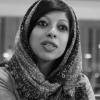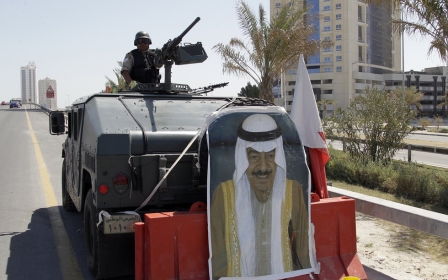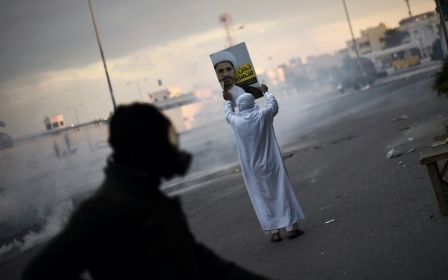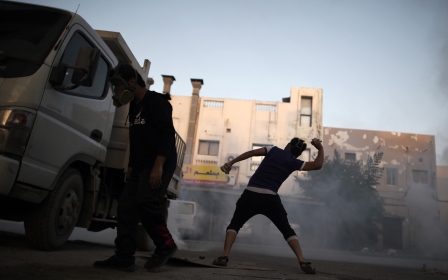My release is not a sign of change for Bahrain's regime

When fellow revolutionaries and activists had to flee Bahrain, I was always grateful not to be in their shoes. I was born and lived in exile until I was 17. Until then, I had never seen my own country, didn’t know most of my relatives, and had absolutely nothing official to prove my nationality. But that made me more passionate about Bahrain, and more determined to help my people.
An emir had to die for me and my family to finally be allowed to return to our land. And as soon as I set foot on its soil, and took a deep breath of humid air, I knew I was home.
Fifteen years later, I walk back into that same airport, with two children and a heavy heart, forced to leave my land, my home and my relatives.
Keeping my child with me in prison had been too costly for the Bahraini government and it decided that punishing me through exile wouldn’t bring as much attention to its crimes.
International pressure has forced the regime that put me in jail while pregnant - the same regime that arrested me from my home with my baby - to release me for “humanitarian” reasons. Nobody who knows anything about the Bahraini regime would be fooled by such actions, including the regime's self-serving democratic allies, especially when this action is directly followed by threats of re-arrest and more trumped-up charges against me.
On the day of my release, confident that nobody cared as much about my fellow countrymen, the regime confirmed the death sentence against three people. Three people who had been involved in the pro-democracy movement in Bahrain. People who have been severely tortured, one of whom is Sami Mushaima.
When a friend of mine, a survivor of the regime's torture chambers, was taken to prison, the first words of support he had heard were from this prisoner. My friend had been tortured badly, could barely walk and was taken blindfolded to have his head shaved (something the regime does here to further humiliate the prisoners). My friend had thought it was a prison guard shaving his head.
But Sami leaned swiftly and whispered to him “be strong, the hardest part is over”. These words might not mean much to us, but to someone who had been tortured until he couldn’t walk, to a person who was in complete darkness and had to crawl to get from one place to another, to a person who hadn’t heard any words that were not aimed at insulting, threatening or dehumanising him, these words were all he had to hang on to.
Mushaima, who had tried to comfort my friend, has nobody to comfort him. He had been tortured too, his torturers had told him that they would get him again and that the next time they would pin the worst case on him. Sami’s torturers were angry for a reason. After his last arrest he had spoken up about the torture he was subjected to and even given the names of some of his torturers.
True to their word, Sami was released and then re-arrested, and then sentenced to death on confessions he had signed after severe torture while blindfolded. After being tortured for 25 days he was taken to prison on a wheelchair. Before my last arrest, Sami had called from the high security building he was in to ask for one thing. “I know there's no hope for me, but please try to find a lawyer for my brother.” His brother is also a political prisoner serving a life sentence. While Sami might think there is no hope for him, we must prove otherwise. The international community should care about all those who are victims of this vicious dictatorship. Not only the ones who are exposed to more media attention.
After being told that I would be released and as I put my few belongings into a plastic bag, I saw Taiba Darwish outside my cell. She stood on the outside of my cell holding on to the bars with tears in her eyes. Are you leaving? They’re releasing you?
Taiba is a political prisoner. She is 41 years old, the mother of three children. She is a political prisoner sentenced and detained for harbouring fugitives, which in Bahrain means harbouring those who call for democracy from a criminal regime that sentences innocent people and tortures them. Taiba has been in prison for one year and has been suffering from various illnesses.
It is very telling that when transferring prisoners to the hospital, Taiba was the only one to be handcuffed. She was told only political prisoners had to be handcuffed. On the last visit to the doctor, the doctor told her off and said he would make an official complaint about her for seeking medical help so often. I often found Taiba in her cell, sitting on her bed looking extremely worried or crying. She has been having horrible dreams.
She worries about her children all day, then would sleep, only to have nightmares about what could happen to them while she was held in a cell. In a recent visit when her child had climbed over the barrier to sit on her lap, the prison warden had stormed inside the visitation room and shouted at Taiba, saying that if her child did not get back on the other side of the table her visits would be cancelled.
I looked up at Taiba not knowing how I should respond. Any reform in the country should have freed me and her and all the other prisoners of conscious in Bahrain, not just me. All I could say to her was that if she shed any tears, I would not leave. She wiped her wet cheeks fast, smiled, and said “Go home to Jude [and] baby Hadi, they need their mum.” I looked at her silently knowing that her kids needed their mum too.
I was released from prison, but not because the regime in Bahrain “is travelling in the right direction” as UK Foreign Secretary Philip Hammond would have you believe. I was released because the dictatorship in Bahrain has evolved. It employed foreign advisors and has learned some very effective lessons. That it must have different categories of victims; those the world knows and those who are nameless. They have learned how to fake reform, by treating some Bahrainis a little better than others.
They have learned how to create the illusion of reforms by setting up bodies that theoretically are there to protect civilians but in reality serve to whitewash the regime's violations. These changes are also made to give “proof” to outside allies whose interest it is to prove that something is changing in the country.
We Bahrainis have chosen the path of resistance to dictators and suffered willingly because we want real change. These fake reforms might make the governments in America and the UK happy, but for us Bahrainis they are proof of a survival mechanism aimed at prolonging the rule of an oppressive dictatorship.
- Zainab al-Khawaja is a Bahraini human rights activist. She was jailed in Isa Town Women’s Prison with her one-year-old son, for over three months. Charges brought against her include "destroying public property" after she tore up a picture of the King of Bahrain twice.
The views expressed in this article belong to the author and do not necessarily reflect the editorial policy of Middle East Eye.
Photo: Bahraini police leave after dispersing protestors in the village of Shahrakkan, south of Manama on 5 April, 2016 (AFP).
Middle East Eye propose une couverture et une analyse indépendantes et incomparables du Moyen-Orient, de l’Afrique du Nord et d’autres régions du monde. Pour en savoir plus sur la reprise de ce contenu et les frais qui s’appliquent, veuillez remplir ce formulaire [en anglais]. Pour en savoir plus sur MEE, cliquez ici [en anglais].





